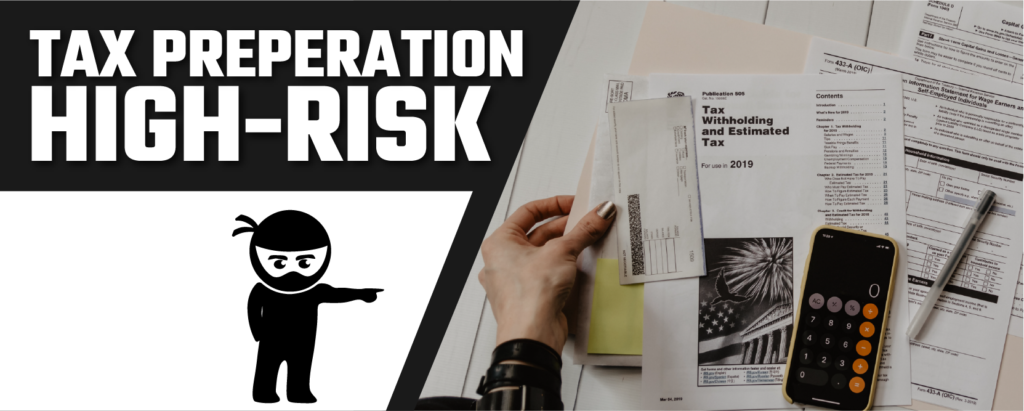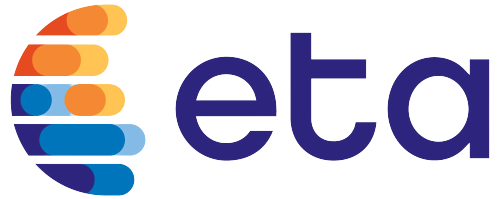Why is Tax Preparation Business considered High-Risk ? Each year, millions of American businesses and individuals face the daunting tax of untangling state and federal tax codes. The pressure mounts as April 15th approaches. Even the most straightforward and simple cases can become a formidable challenge if just a single new factor is added.
The total combined amount of money appropriated by the U.S. government from individuals and businesses in some form of tax has ballooned to nearly $3.5 trillion per year . That would put the federal government at 8th place on the list of the world’s largest industries by revenue, one rank higher than the automotive industry and one rank below the global oil and gas exploration and production industry. An enormous amount of money is transferred from millions of individuals and businesses to a single recipient each year.
There are many political, economic, and societal implications of this, of course, but one of the most basic is that a whole bunch of people need a whole bunch of help with a whole bunch of issues related to taxes each year, so it is unlikely that we will see much of a decline in the demand for tax preparation services any time soon.
Label Shock
That may be why you decided to start your own tax preparation business. One thing you need is a way for clients to pay you. That usually involves a merchant account with a bank or other payment processor. You visit your local bank to make arrangements, and the customer service representative informs you that they don’t accept clients in high-risk industries, one of which is tax preparation.
You may be surprised by that, especially if none of your clients are high-risk businesses. But, the answer is the same at every other bank you try. Some are willing to consider you, but the application process will be long and complex and have stringent requirements for approval.
High-Risk Merchant Accounts
This, of course, means that you need a high-risk merchant account. You will need to find a payment processor that is willing to take on clients that are high-risk businesses and that has knowledge and experience in high-risk payment processing, the infrastructure for underwriting high-risk clients, and the technological tools needed to provide timely and reliable payment processing services.
First, however, let’s make sure that we understand what it is about tax preparation businesses that causes banks and payment processors to view them as high risk. Generally speaking, there are three main factors that make tax preparers high risk: unreasonable customer expectations, high chargeback rates, and fraud.
Risk No. 1: Unreasonable Customer Expectations
In a way, tax preparers satisfy customers by minimizing their disappointment. That’s not too difficult when you’re able to get your client a hefty refund. However, ultimately, people go to tax preparers not because they want to, but because they need to. They’re not coming to you excited to add something nice to their lives. In general, they’re coming to you expecting help to minimize the amount of “something nice” that will be lost from their lives.
Businesses and individuals that have been filing taxes for years will likely know what expectations are reasonable and what expectations are destined for betrayal. Many, however, want their returns to be accurate, but accurate in their favor. The smallest change either in the client’s circumstances or the voluminous tax code could end up making the refund much lower than expected, or eliminate it altogether, so this year’s tax bill could be higher than last year’s, even if your business didn’t perform better.
That can make the client feel like you didn’t do a good job or that you cheated him. In many cases, the issue can be resolved quickly by walking the client through the basic steps and calculations of preparing his return. In some cases, though, the client will pay you for your services but will continue stewing about it for a few days, eventually deciding that he wants a refund from you , rather than just from the federal government.
Picking Your Battles; Cutting Your Losses
If he contacts you about it, you may be able to talk through it or provide a full or partial refund. However, there is a significant possibility that he will instead contact the credit card company and demand a chargeback. A high frequency of chargebacks is one of the main factors that earn businesses the label “High Risk.” It is also a common factor in banks suddenly deciding to cancel your merchant account if you were able to open one. Either way, it will cost you a lot of money if not controlled.
The best way to prevent this is to make sure early in the process that the client knows what can realistically be expected. If you discover something that will make a significant change in the results, let your client know about it as soon as possible, especially if it’s bad news. If you don’t think you can meet your client’s expectations, tell him so. It might lose you a customer, but your straightforward honesty may be what brings him back to you with more reasonable expectations after he finds out that no other tax preparer can meet his original expectations either.
Risk No. 2: Chargeback Rates
As mentioned, this risk is often the result of a customer’s unreasonable expectations. Every business can expect to deal with chargebacks to some degree, but tax preparation’s higher probability of customer dissatisfaction regardless of how well you do your job increases the risk, and in this case, gives banks a reason to put you in the high-risk business category.
Chargebacks are a drain on time and money for your business and the bank. The bank provides the refund to the customer and then penalizes your account. Providing a refund directly to the customer and preventing a chargeback and the extra cost may be the best way to minimize your loss. Having a clear and reasonable refund policy and maintaining an appropriate level of communication with your clients can make them more likely to contact you first, instead of the bank.
Chargebacks Have Power in Numbers
Each month, the bank or payment processor adds up all the chargebacks initiated that month and divides it by the total of all transactions. The resulting percentage is called the “chargeback rate.” Banks set a certain percentage as the maximum acceptable level. The level is not high, and is typically about 3% or less. Exceeding that amount will result in your merchant account being suspended temporarily or canceled outright. If that happens, the loss incurred from the chargeback directly is joined by the loss you will incur from not having a way for your clients to pay you.
Realistically speaking, it’s unlikely that you will be able to eliminate chargebacks completely, but there are various chargeback prevention and management tools available, and a high-risk payment processor will be able to help you keep chargebacks to a minimum, in both quantity and cost.
Risk Number 3: Fraud
Any situation that involves the recording, calculation, and management of money is a potential target of fraud . Fraudulent chargebacks are one of the most common methods used, and the higher susceptibility of tax preparation businesses to chargebacks means that there is an increased risk of fraud. The fraudster often waits until near the end of the six-month period in which she can initiate a chargeback. This makes it harder to notice since each day creates more separation from when the services were provided and the original payment was made.
As is the case with chargebacks, it’s not realistic to think that all fraud can be eliminated, but managing your business well, thoroughly ensuring compliance with best practices and industry rules and regulations, and paying careful attention to what’s happening in your account can significantly mitigate the risk and minimize the loss incurred if fraud does happen.
Mitigating Risk in Your Tax Preparation Business
Knowing the risk factors that have earned your company the label “high-risk business” is the necessary first step in mitigating those risks. It can also help you answer the question of, “Why is Tax Preparation Business High-Risk?” If you are just now setting up your business, keep those risk factors in mind as you put everything together. That can reduce the risks from the start. If you have already been in operation for a while, it might be best to start the changes by addressing the risk that is the easiest and quickest to handle.
And, of course, a high-risk payment processor can be a highly effective resource in getting your business off on the right foot as well as in strengthening your protection against risks that could do serious damage. If possible, find a high-risk payment processor that has a good level of experience in the tax preparation industry. Don’t hesitate to ask questions or to go to a different processor. Your business and the payment processor will both benefit from ensuring that your needs and the processor’s abilities are a good match.





